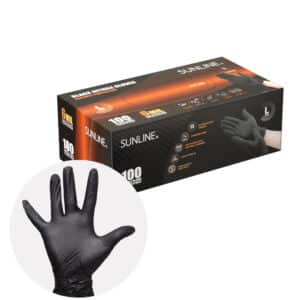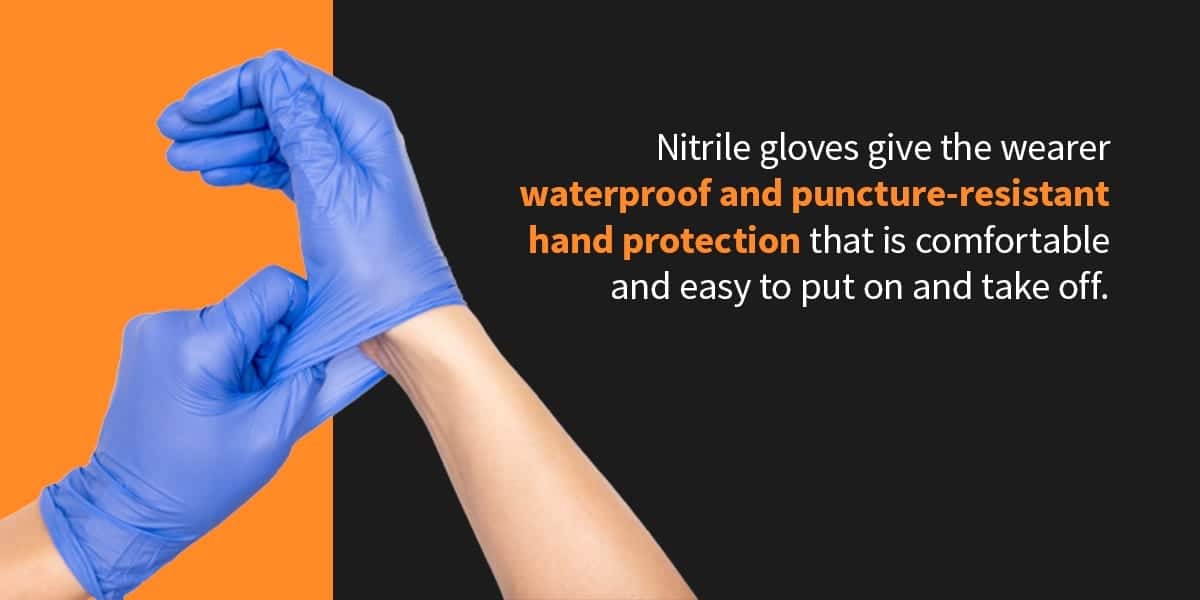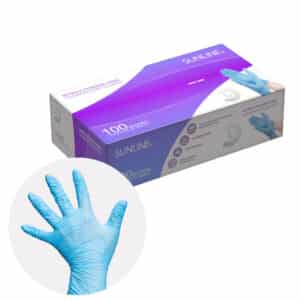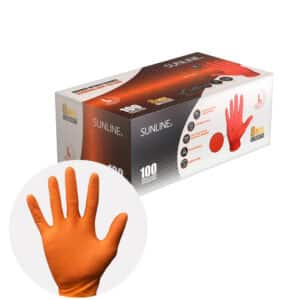Nitrile Gloves
Showing all 3 results
-

Sunline Black Nitrile Disposable Gloves (6mil) – (Carton of 10 Boxes – $8.99/box)
All quantities at $89.90/carton -
Sale!

Sunline Blue Nitrile Medical/Industrial Use Examination Gloves (4mil) – (Carton of 10 Boxes – $5.99/box)
All quantities at $59.90/carton -

Sunline Orange Nitrile Gloves (8mil) – (Carton of 10 Boxes – $14.99/box)
All quantities at $149.90/carton
Our Process
We are vigilant about selecting only the top manufacturers for our gloves. All our gloves are sourced from high-quality, FDA and CE certified, expertly-vetted vendors.
We require all our vendors to complete a thorough pre-shipment inspection with corresponding documentation, and always have our staff present to manage and oversee the process.
Proof of glove quality, manufacturing standards, proper product loading and documentation (see sample Bill of Lading and AQI Reports) are extremely important in glove facilitation.

Learn More About Our Glove Facilitation Process

Wearing the appropriate protective gloves is essential in many industries. Discerning which type of glove is best is a crucial task for adequate protection. To simplify the decision-making process, we’ll cover what nitrile disposable gloves are, what they protect against, the defining features of different types of nitrile gloves and where to order nitrile gloves in bulk.
What Are Nitrile Gloves and What Are They Made Out Of?
Nitrile gloves are a form of personal protective equipment (PPE) that provides hand protection. The disposable gloves get their name from the material they are made out of — a compound called nitrile — which is resistant to both chemicals and punctures. Because nitrile gloves are made from synthetic rubber, they are a suitable PPE alternative for those with a latex allergy.
What Are Nitrile Gloves Made From?
Nitrile is essentially a synthetic, reprocessed version of latex. Nitrile gloves start out as rubber from rubber trees before being transformed into latex rubber. After becoming latex rubber, the gloves are reprocessed again until they form into the nitrile compound material. This extra processing eliminates all latex proteins, making the gloves latex-free and safe for anyone with a latex allergy.
Although the intense amount of processing used to make nitrile gloves is far pricier than that for latex gloves, modern technology has made more cost-effective practices possible. Today, nitrile gloves are as affordable and accessible as regular latex gloves and have a lower allergy rating.
What Do Nitrile Gloves Protect Against?
Numerous industries put workers in contact with irritants, chemicals and other potentially hazardous materials. Wearing disposable nitrile gloves can protect these workers from skin irritations, infections, burns, cuts, puncture wounds, abrasions and more. Nitrile gloves can also keep employees safe from harmful microorganisms, including fungus, bacteria and viruses, which makes them an incredibly versatile PPE option.
Along with protecting the wearer, nitrile gloves can preserve the materials the wearer is working with, such as electronics, metal and glass. In some industries, wearing nitrile gloves can protect other people the workers may encounter, such as medical patients.

Uses of Nitrile Gloves
The quality of nitrile gloves makes them suitable for a plethora of industries in which employees are likely to contact food or hazards, such as abrasive materials or chemicals. Nitrile gloves give the wearer waterproof and puncture-resistant hand protection that is comfortable and easy to put on and take off. The durability of nitrile gloves also makes them well-suited for industries that require extended PPE use.
Because nitrile gloves can protect wearers from hazards like chemicals, pesticides and commercial cleaning products, they are often used in industrial and commercial settings. Additionally, nitrile gloves are commonly found in medical settings because they offer a two-way contact barrier for evaluating patients, disposing of medical waste and handling biological materials. In fact, the FDA recommends wearing disposable nitrile gloves in hospitals and other healthcare facilities.
The following industries benefit from using nitrile gloves:
- Healthcare
- Dentistry and hygiene
- Pharmaceutical
- Laboratory work
- Food service
- Manufacturing and assembly
- Chemical manufacturing
Medical vs. Non-Medical Nitrile Gloves
The first step in choosing nitrile gloves is to decide between medical-grade nitrile gloves and non-medical nitrile gloves. Nitrile gloves are deemed medical or non-medical based on what level of FDA safety guidelines and requirements they meet. How you plan to use the gloves will determine which type you need to purchase.
To help with your decision, here is a comparison of nitrile medical gloves and non-medical gloves:
- Non-medical: This type of nitrile glove is best for activities that involve handling harsh chemicals and solvents or sharp objects. Industries that use non-medical nitrile gloves include the janitorial, automotive and food service sectors.
- Medical grade: Medical grade nitrile gloves have been thoroughly tested to meet FDA guidelines to ensure the gloves provide adequate durability, strength and barrier for medical examinations. Because of these qualities, nitrile exam gloves are the superior glove choice when there is a risk of contact with bloodborne pathogens or environmental contaminants. Medical grade nitrile gloves are most often used in hospitals, medical offices and dental offices.
Nitrile Gloves Options
Below are your three main options when selecting nitrile gloves:
1. Color
Nitrile gloves come in a vast assortment of colors. Often, organizations color-code their nitrile gloves to avoid cross-contamination. In general, black nitrile gloves are frequently used to cover up messiness, while brightly colored nitrile gloves are used to stand out and signal safety compliance. If your work typically involves sharp objects, consider bright nitrile gloves under darker nitrile gloves for extra protection because seeing the brighter color appear will quickly alert you of a cut or puncture in the darker gloves.
2. Size
A well-fitting glove is crucial for workers. The right-sized glove enhances comfort and tactile sensitivity, enabling employees to perform their jobs better. Nitrile gloves are typically available in small, medium, large and extra-large sizes. The gloves are ambidextrous and unisex, which means you won’t have to worry about matching pairs or keeping multiple glove styles in supply.
3. Thickness
Disposable nitrile gloves are available in a variety of thicknesses, also referred to as gauges. The higher the thickness of a nitrile glove, the more hand protection it can provide. Because thicker nitrile gloves grant a longer permeation time for chemicals and more tear resistance, they are particularly suitable for harsh industrial environments. Nitrile gloves that are thinner give the wearer a higher level of flexibility and dexterity.
Other Nitrile Gloves Features
In addition to nitrile gloves colors, sizes and thickness, consider these features when picking your PPE:
- Texture: If you will need nitrile gloves with an enhanced grip, look for gloves with a textured finish on the fingers and palm.
- Powder-free: While powdered nitrile gloves can be easier to slide on because the powder absorbs extra moisture, they can leave residue behind. Powder-free gloves with a chlorinated or polymer finish can be equally as easy to put on and take off without making the mess that powder creates.
- Non-sterile: Sterile nitrile gloves are gloves that meet the FDA standards for sterilization techniques, whereas non-sterile gloves are sterilized by someone other than the glove manufacturer and have a lower acceptable quality level for pinholes. Typically, sterile gloves are used for surgical procedures. Non-sterile gloves are used for non-surgical medical procedures and examinations because they do not pose a higher risk of infection.
- Chemo-rated: Disposable gloves need to offer a certain level of protection to be appropriate for handling chemotherapy drugs. While other gloves like vinyl gloves are too permeable to deal with chemo drugs, nitrile gloves are chemo-rated because they offer more protection.
- Latex-free: Because many people have an allergy or sensitivity to latex, latex-free nitrile gloves are a great alternative to disposable latex gloves.
Why Trust SUNLINE Supply for Nitrile Examination Gloves?
SUNLINE Supply is an FDA-approved company that provides nitrile gloves from only high-quality, FDA-certified and expertly vetted vendors. At SUNLINE Supply, we offer latex-free, powder-free non-sterile nitrile gloves that feature a micro-roughened surface for improved grip on equipment, tools and products no matter the conditions. Our nitrile gloves also grant superior touch-sensitivity to simplify complex tasks that require precision while still providing dependable protection.
Order Nitrile Gloves From SUNLINE Supply
For reliable nitrile glove options and availability, order your nitrile gloves from SUNLINE Supply. We keep a large quantity of FDA-certified PPE in stock so it’s ready to ship quickly. We also offer rapid production and order fulfillment in any volume so you can receive your PPE order when you need it.
To place your nitrile glove order, contact SUNLINE Supply today.



